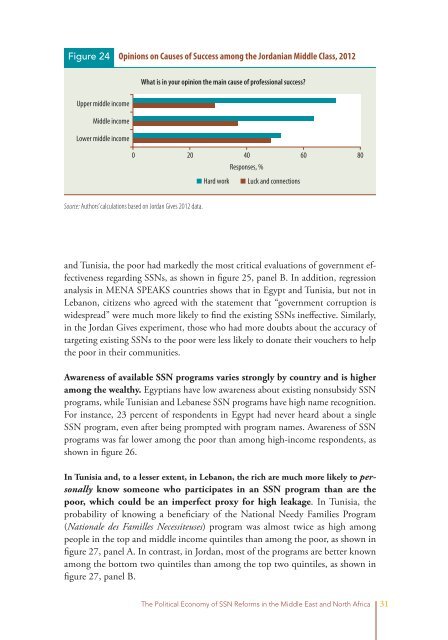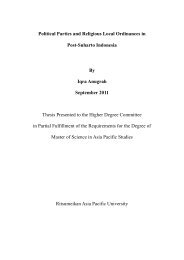You also want an ePaper? Increase the reach of your titles
YUMPU automatically turns print PDFs into web optimized ePapers that Google loves.
Figure 24 Opinions on Causes of Success among the Jordanian Middle Class, 2012<br />
Upper middle income<br />
Middle income<br />
Lower middle income<br />
0<br />
Source: Authors’ calculations based on Jordan Gives 2012 data.<br />
What is in your opinion the main cause of professional success?<br />
20 40<br />
Responses, %<br />
60<br />
80<br />
Hard work Luck <strong>and</strong> connections<br />
<strong>and</strong> Tunisia, the poor had markedly the most critical evaluations of government effectiveness<br />
regarding SSNs, as shown in figure 25, panel B. In addition, regression<br />
analysis in MENA SPEAKS countries shows that in Egypt <strong>and</strong> Tunisia, but not in<br />
Lebanon, citizens who agreed with the statement that “government corruption is<br />
widespread” were much more likely to find the existing SSNs ineffective. Similarly,<br />
in the Jordan Gives experiment, those who had more doubts about the accuracy of<br />
targeting existing SSNs to the poor were less likely to donate their vouchers to help<br />
the poor in their communities.<br />
Awareness of available SSN programs varies strongly by country <strong>and</strong> is higher<br />
among the wealthy. Egyptians have low awareness about existing nonsubsidy SSN<br />
programs, while Tunisian <strong>and</strong> Lebanese SSN programs have high name recognition.<br />
For instance, 23 percent of respondents in Egypt had never heard about a single<br />
SSN program, even after being prompted with program names. Awareness of SSN<br />
programs was far lower among the poor than among high-income respondents, as<br />
shown in figure 26.<br />
In Tunisia <strong>and</strong>, to a lesser extent, in Lebanon, the rich are much more likely to personally<br />
know someone who participates in an SSN program than are the<br />
poor, which could be an imperfect proxy for high leakage. In Tunisia, the<br />
probability of knowing a beneficiary of the National Needy Families Program<br />
(Nationale des Familles Necessiteuses) program was almost twice as high among<br />
people in the top <strong>and</strong> middle income quintiles than among the poor, as shown in<br />
figure 27, panel A. In contrast, in Jordan, most of the programs are better known<br />
among the bottom two quintiles than among the top two quintiles, as shown in<br />
figure 27, panel B.<br />
The Political Economy of SSN Reforms in the Middle East <strong>and</strong> North Africa 31



